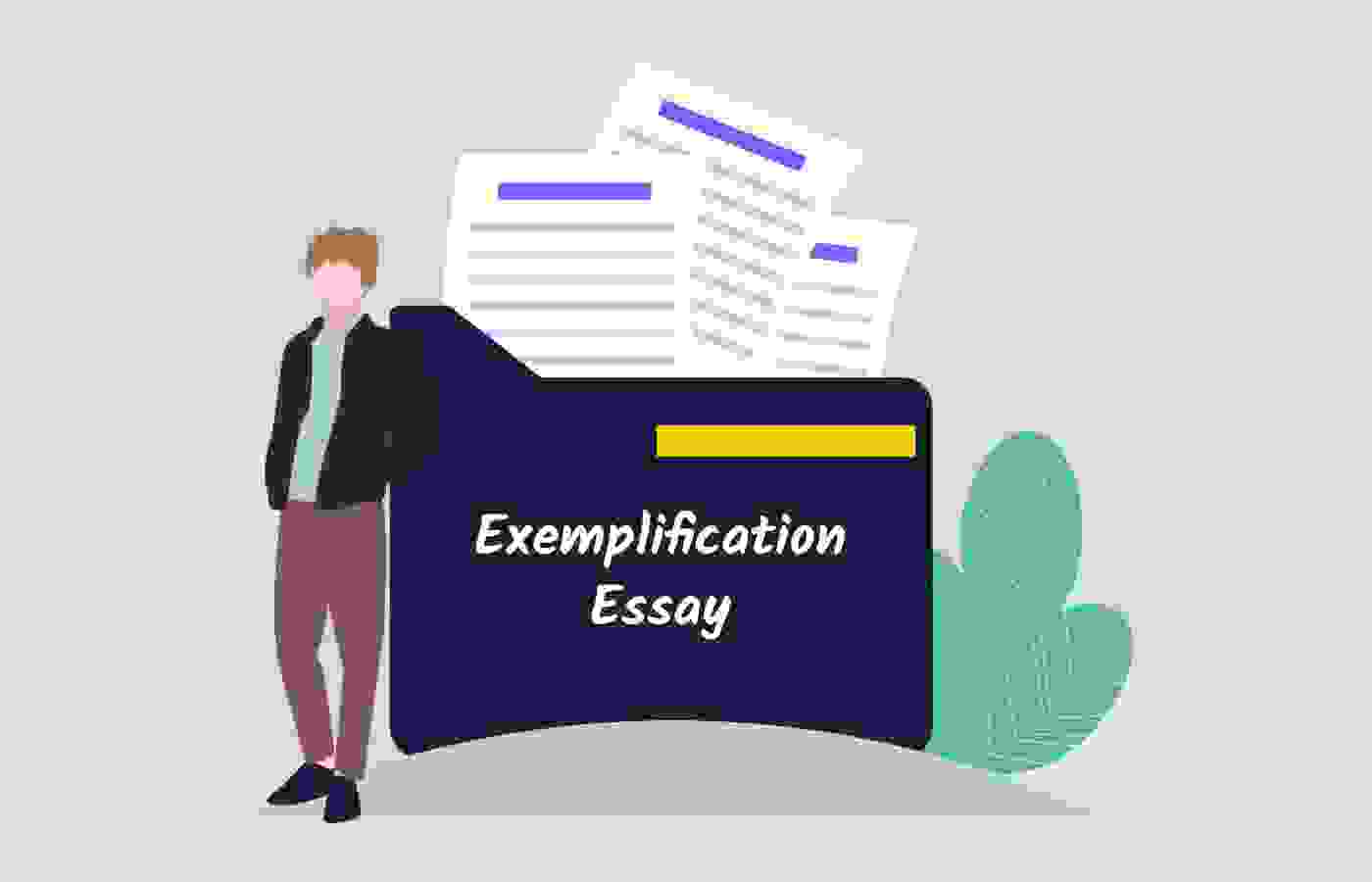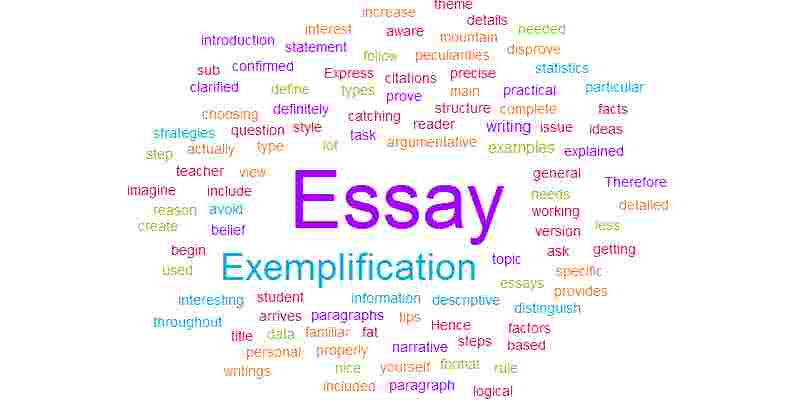Exemplification Essay | Master the Art of Writing
Published 02-22-2024
16539

Exemplification Essay | Master the Art of Writing
A widely accepted exemplification essay definition is that it is an argumentative essay that provides specific examples to support a thesis statement. Unlike other types of essays that may rely more on theoretical concepts or generalizations, exemplification essays focus on providing concrete evidence and instances to illustrate and validate the main argument or point being made. These essays often require extensive research to gather relevant examples and data, which are then used to persuade the audience of the validity of the writer's perspective. The goal of an exemplification essay is to make the argument more convincing and understandable by offering real-life examples that the audience can relate to and understand.
College students are often required to write exemplification essays as part of their academic coursework. Exemplification essays are commonly assigned in various disciplines, including English composition, literature, sociology, psychology and history, among others. These essays serve as an effective way for students to demonstrate their ability to research, analyze, and present arguments using specific examples and evidence. By requiring students to gather and organize relevant examples to support their thesis statements, exemplification essays help develop critical thinking, research, and writing skills essential for academic success.
Upon completing this article, you will gain insight into the definition of an exemplification essay, its key characteristics, length requirements, as well as receive guidance on designing a basic outline and steps for writing one, accompanied by a practical example. Additionally, you will learn about the dos and don'ts of composing an A+ grade exemplification essay.
Comprehensive guide to mastering exemplification essays
Literary Owls is an online website and a platform dedicated to helping students unlock their potential in academic writing. This dedication has seen its experts in essay writing, fondly referred to as night owls, explore the world of exemplification essays in order to equip you with the tools and knowledge you need to excel in this genre, irrespective of whether you are a seasoned writer or new to the concept. Understanding exemplification essays is essential for success in your academic endeavors. With that in mind, it is important that we unravel the nitty gritty of this fascinating form of writing.
What is an Exemplification Essay?
As stated earlier, an exemplification essay is a type of argumentative essay that relies heavily on examples to support its thesis statement. Unlike other essay types that may lean more towards theoretical concepts, exemplification essays require concrete evidence to substantiate claims. Through the careful selection and presentation of relevant examples, writers aim to persuade their audience and convey a clear message. In essence, exemplification essays serve as a platform for highlighting real-life examples that illustrate and reinforce the writer's argument.
What are the key components of an exemplification essay?
Del Mar College underscores the importance of understanding the key components of an exemplification essay in order to write a compelling exemplification essay.
First, there has to be a thesis statement. This is a clear statement that outlines the main argument or point of the essay. Secondly, an exemplification essay should have examples, or the specific instances, anecdotes, statistics, or case studies used to illustrate and support the thesis. Thirdly, it should have an in-depth analysis, where the examples are examined and interpreted in order to demonstrate their relevance and significance to the thesis. Also, an exemplification essay should have transition words. Smooth transitions between paragraphs and examples to maintain coherence and flow. Lastly, it should have a well-thought-out conclusion. This is basically a summary of the main points and a reaffirmation of the thesis, leaving a lasting impression on the reader. By mastering these components, you can create a well-structured and persuasive exemplification essay that resonates with your audience.
A step-by-step guide to writing your exemplification essay
We hope by now that you have understood the key components of an exemplification essay. Now is the time to explore how to write one effectively. Literary Owls has compiled a series of steps to ensure success in your exemplification essay writing.
I. Choose a topic
Select a topic that interests you and is conducive to providing ample examples for support.
II. Conduct research
Gather relevant examples and evidence to enhance your arguments.
III. Develop a thesis
Formulate a clear and concise thesis statement that encapsulates the main argument of your essay.
IV. Create an outline
Organize your ideas and examples into a coherent structure, including an introduction, body paragraphs, and a conclusion.
V. Write the introduction
Start with a compelling hook to engage your reader, followed by a brief overview of the topic and, finally, your thesis statement.
VI. Body paragraphs
Present your examples and analysis in a logical sequence, ensuring each paragraph contributes to the overall argument.
VII. Conclusion
Summarize your key points, restate your thesis, and leave the reader with a thought-provoking insight or call to action.
VIII. Revise and edit
Review your essay for clarity, coherence, and grammar errors, making revisions as needed to enhance its effectiveness. By following these steps, you can create a polished and persuasive exemplification essay that displays your academic prowess.
Dos and don'ts of writing exemplification essays
It is time to explore some dos and don'ts of writing exemplification essays in order to further enhance your understanding of this genre.
|
Dos |
Don'ts |
|
|
In summary, take time to create a polished and compelling essay. You can avoid common pitfalls and create a compelling exemplification essay that captivates your audience by adhering to the dos and don'ts in the table above.
The anatomy of a stellar exemplification essay
In this section, the anatomy of a stellar exemplification essay will be dissected in order to provide you with the essential tools and insights to write a compelling and persuasive piece of writing. So far, we have provided you with a comprehensive guide to mastering exemplification essays. To this end, therefore, you are no longer new to the concept but on your way to becoming a seasoned writer. Either way, understanding the key components of an exemplification essay is crucial for success in your academic endeavors.
As such, it is important that you learn the blueprint for creating exceptional exemplification essays.
Thesis statement
At the heart of every exemplification essay lies a strong and concise thesis statement. This statement serves as the foundation upon which your entire essay is built. It should clearly articulate the main argument or point you intend to prove throughout your essay. A well-crafted thesis statement not only guides the direction of your writing but also provides clarity and focus for your reader.
Supporting examples
The cornerstone of an exemplification essay is the use of supporting examples to reinforce your thesis statement. These examples can take various forms, including anecdotes, statistics, case studies, or expert opinions. The key is to select examples that are relevant, credible, and effectively illustrate the points you are trying to make. Remember, quality trumps quantity when it comes to supporting examples. Focus on a few well-chosen examples that pack a punch rather than overwhelming your reader with an abundance of mediocre examples.
Organization and cohesion
A stellar exemplification essay is characterized by its organization and cohesion. Each paragraph should flow seamlessly into the next, guiding the reader through your argument with clarity and precision. Start with a strong introduction that hooks your reader and clearly states your thesis. Follow this with well-structured body paragraphs, each focused on a single supporting example and accompanied by thorough analysis. Finally, wrap up your essay with a concise conclusion that reinforces your thesis and leaves a lasting impression on your reader.
Transitions and cohesive devices
Transitions play a crucial role in maintaining the flow and coherence of your exemplification essay. These are words or phrases that connect one idea to the next, signaling shifts in thought or direction. Examples of transitions include "furthermore," "however," "in addition," and "conversely." By incorporating these cohesive devices throughout your essay, you will ensure a smooth and seamless reading experience for your audience.
Read our article on 150+ Transition Words for Essays
Revision and polishing
No exemplification essay is complete without thorough revision and polishing. Take the time to review your essay carefully, paying attention to clarity, coherence, and grammar. Look for opportunities to strengthen your argument, refine your language, and eliminate any unnecessary clutter. Consider seeking feedback from peers or instructors to gain valuable insights and perspectives. Remember, the devil is in the details, so do not underestimate the importance of this final step in the writing process.
Choosing compelling examples for exemplification essays
This section presents ways of selecting compelling examples to unleash your creativity in exemplification essays. Choosing the right examples is essential for writing a persuasive and impactful essay, irrespective of whether you are brainstorming ideas or refining your arguments.
Our night owls at Literary Owls have researched the strategies for finding and incorporating compelling examples that will captivate your audience and elevate your writing to new heights, and are presented below.
The power of compelling examples
At the heart of every exemplification essay lies the power of compelling examples. These examples serve as the building blocks of your argument, providing concrete evidence to support your thesis statement and engage your reader. You can draw them from personal experiences, historical events, scientific studies or literary works. The key is to choose examples that are relevant, vivid, and thought provoking. Selecting compelling examples not only strengthens your argument but also unleashes your creativity, and leaves a lasting impression on your audience.
Strategies for finding compelling examples
At first, finding compelling examples for your exemplification essay may seem challenging but, with the right strategies you can uncover a wealth of material to draw from. Firstly, you may want to consider your personal experiences. Reflect on your own experiences and observations to find examples that resonate with your thesis statement. Personal anecdotes can add a unique and authentic touch to your essay, making it more relatable and engaging for your reader. Secondly, conduct some research to find relatable examples from a variety of sources, including academic journals, books, articles, and reputable websites. Consider studies, case studies, and statistics that support your argument and provide credibility to your essay.
Thirdly, the relevance of real-life events cannot be overstated. You can draw great inspiration from real-life (historical or contemporary) events to illustrate the relevance of your thesis statement. A historical event, or a cultural phenomenon, real-life examples can add depth and context to your essay, irrespective of whether it is a current news story. Lastly, you can incorporate references from literature, film, music, art, or popular culture to enrich your essay and connect with your audience. Drawing parallels between your thesis statement and familiar cultural references can make your argument more relatable and compelling.
Incorporating compelling examples into your essay
Once you have found compelling examples for your exemplification essay, it is essential to incorporate them effectively into your writing. Literary Owls has looked effective strategies of doing this and found providing context, analyzing and interpreting, and using variety as the most effective ones.
In providing context, it is important to introduce each example with sufficient context to help your reader understand its relevance to your thesis statement. Explain why the example is significant and how it supports your argument. Regarding analyzing and interpreting, it is important to take the time to analyze and interpret the implications of presenting each example on your argument. Discuss the underlying themes, trends, or patterns revealed by the example and explain how they strengthen your overall thesis. Similarly, using variety implies incorporating a variety of examples, including personal anecdotes, statistical data, case studies, and cultural references. This not only keeps your essay engaging and dynamic but also adds depth and richness to your argument, making it more persuasive and compelling.
Create a cohesive outline to give structure to your essay
Designing a cohesive outline to give structure to your exemplification essay is important. A well-organized outline is essential for guiding your writing process, ensuring clarity and coherence in your arguments, and ultimately, producing a polished and persuasive essay. However, it is essential to understand its purpose before diving into the details of crafting an outline.
An outline serves as a roadmap for your essay, outlining the main points, supporting examples, and overall structure of your argument. By organizing your thoughts and ideas in a logical sequence, an outline provides a framework for effective communication and helps you stay focused on your thesis statement throughout the writing process.
Elements of a cohesive outline
A cohesive outline comprises several key elements that work together to give structure to your essay, and include the introduction, body parts and conclusion. The introduction is the opening section of your outline and should include a hook to grab the reader's attention, background information on the topic, and your thesis statement. Each of the body paragraphs should focus on a single supporting point or example that reinforces your thesis statement. You should include topic sentences to introduce each paragraph and supporting details or evidence to bolster your arguments. The conclusion part of the outline ought to summarize the main points of your essay and restate your thesis statement in different words. Be sure to end with a thought-provoking insight or call to action to leave a lasting impression on your reader.
Tips for designing an effective outline
Creating an effective outline requires careful planning and attention to detail. Consider the following tips from our night owls.
I. Start broad, then narrow down
Begin with a broad overview of your topic and thesis statement, and then gradually narrow down your focus to specific supporting points and examples.
II. Use hierarchical structure
Organize your outline using a hierarchical structure, with main points and sub points clearly shown. This helps maintain clarity and coherence in your arguments.
III. Be flexible
Remember that your outline is a flexible tool that can evolve as you conduct research and refine your arguments. Do not be afraid to make revisions and adjustments as needed to better align with your essay's direction.
IV. Review and revise
Take precious time to review and revise it for clarity, coherence, and effectiveness once you have completed your outline. Look for opportunities to strengthen your arguments and ensure smooth transitions between sections.
Tips for effective transitions that elevate your writing
In this section, we explore the importance of effective transitions in exemplification essays and provide you with valuable tips to elevate your writing. As stated earlier, transitions play a crucial role in guiding your reader through your arguments, maintaining coherence and flow, and ultimately, enhancing the overall quality of your essay. As such, our night owls have compiled a series of strategies for incorporating seamless transitions that will take your exemplification essays to the next level.
Understanding the role of transitions
It is important to understand the role of transitions in exemplification essays before exploring the tips for effective transitions. Transitions are the bridges that connect one idea to the next, guiding your reader through the logical progression of your argument. They serve to signal shifts in thought, indicate relationships between ideas, and ensure smooth transitions between paragraphs and sections. By using transitions effectively, you can create a cohesive and engaging narrative that keeps your reader hooked from start to finish.
Tips for incorporating effective transitions
We have established the importance of transitions. It is now time to highlight the tips for incorporating them effectively into your exemplification essays.
I. Use transition words and phrases
Start by familiarizing yourself with a variety of transition words and phrases, such as "however," "in addition," "furthermore," "on the other hand," and "consequently." These words help signal relationships between ideas and facilitate smooth transitions between paragraphs and sections.
II. Place the transitions strategically
Place transitions strategically at the beginning or end of paragraphs, as well as within sentences, to guide your reader through the flow of your argument. Avoid abrupt shifts in topic or focus by using transitions to bridge the gap between ideas.
III. Build logical connections
Ensure that your transitions establish logical connections between ideas, reinforcing the coherence of your argument. Use transitions to show cause and effect, contrast and comparison, sequence and progression, and other relationships between ideas.
IV. Vary your transitions
Maintain your writing engaging by varying the types of transitions you use throughout your essay. Mix up transitional words and phrases to avoid repetition and monotony, and tailor your choices to the specific context and purpose of each transition.
V. Revise and edit
Take the time to review and revise your transitions for clarity, coherence, and effectiveness upon completion of your exemplification essay. Look for opportunities to strengthen connections between ideas and ensure that each transition serves its intended purpose.
Examples of effective transitions
Let us consider some examples in order to illustrate the importance of effective transitions.
- "Furthermore, the study's findings underscore the importance of early childhood education in shaping future academic success."
- "On the other hand, critics argue that the proposed policy fails to address underlying socioeconomic inequalities."
- "In conclusion, the evidence presented supports the need for further research in this area to fully understand the impact of climate change on global ecosystems."
The power of persuasion: convincing your audience
This section provides you with valuable insights to effectively convince your audience. Persuasion is a crucial skill in academic writing that allows you to sway your reader's opinions, evoke emotions, and inspire action. There are several ways in which you can harness the power of persuasion in order to write a compelling exemplification essay that leaves a lasting impression on your audience. But, let us understand why it is essential in exemplification essays before diving into that.
Persuasion is the ability to influence others' beliefs, attitudes, and behaviors through compelling arguments and evidence. In exemplification essays, persuasion is central to convincing your audience of the validity of your thesis statement and the importance of your supporting examples. By mastering persuasion, you can effectively communicate your ideas, sway opinions, and inspire action in your readers.
Strategies for effective persuasion
We have understood the importance of persuasion and now it is the time to explore some strategies for effectively persuading your audience in exemplification essays. First, know your audience. This will enable you to customize your arguments and examples to resonate with your audience's beliefs, values, and interests. Consider their background, knowledge level, and potential biases when creating your persuasive appeals. Secondly, build your credibility and trust. This is achieved by citing reputable sources, presenting well-reasoned arguments, and demonstrating expertise in your subject matter. Establishing credibility enhances the persuasiveness of your essay and increases the likelihood of your audience accepting your arguments.
Thirdly, appeal to emotions by evoking empathy, sympathy, or compassion in your audience. Do this by incorporating personal anecdotes, vivid imagery, and powerful language to stir emotions and elicit a strong emotional response. Emotional appeals can be particularly effective in persuading your audience to connect with your arguments on a deeper level. Additionally, provide solid examples. Support your arguments with concrete examples, anecdotes, statistics, and case studies that illustrate the real-world implications of your thesis statement. Concrete examples make abstract concepts tangible and relatable, helping to strengthen your persuasive appeal and convince your audience of the validity of your arguments.
Lastly, anticipate counterarguments. You can achieve this by addressing potential counterarguments and objections to your thesis statement, demonstrating a thorough understanding of opposing viewpoints and presenting compelling rebuttals. Anticipating counterarguments shows intellectual honesty and strengthens your overall persuasive argument.
The power of exemplification essays in persuasion
Exemplification essays are particularly better positioned for persuasion, as they rely heavily on concrete examples to support arguments. By presenting vivid and compelling examples that resonate with your audience, you can effectively persuade them of the validity of your thesis statement and the importance of your arguments. Exemplification essays allow you to demonstrate the real-world implications of your ideas, making them more tangible and convincing to your audience.
Avoiding common pitfalls in exemplification essays
It is now time to explore the common pitfalls encountered when writing exemplification essays and provide you with practical tips to steer clear of them. Exemplification essays are a powerful tool for conveying ideas through concrete examples, but they also come with their own set of challenges. By identifying and avoiding these pitfalls, you can elevate the quality of your writing and produce compelling essays that captivate your audience.
I. Lack of clarity in thesis statement
A lack of clarity in the thesis statement is perhaps among the most common pitfalls in exemplification essays. Your thesis statement serves as the backbone of your essay that provides a clear and concise summary of your main argument. Without a clear thesis statement, your essay may lack focus and coherence, leaving your reader confused or unsure of your intentions. To avoid this pitfall, take the time to create a well-defined thesis statement that clearly articulates the main argument of your essay and sets the stage for the supporting examples to come.
II. Insufficient or irrelevant examples
Another common pitfall in exemplification essays is the use of insufficient or irrelevant examples to support your arguments. Examples serve as the evidence that validates your thesis statement and convinces your reader of its validity. However, using examples that are vague, outdated, or unrelated to your argument can weaken your essay and undermine your credibility. To avoid this pitfall, carefully select examples that are relevant, recent, and directly related to your thesis statement. Ensure that each example effectively illustrates the point you are trying to make and strengthens your overall argument.
III. Lack of organization and structure
Poor organization and structure can also derail an exemplification essay, making it difficult for your reader to follow your argument and understand your points. Without a clear and logical structure, your essay may feel disjointed or chaotic, leaving your reader feeling lost or disengaged. To avoid this pitfall, take the time to plan and organize your essay before you begin writing. Develop a clear outline that outlines the main points you will cover and the order in which you will present them. Use transitional phrases and cohesive devices to guide your reader through the flow of your argument and ensure smooth transitions between paragraphs and sections.
IV. Overdependence on examples
In as much as examples are essential in exemplification essays, overreliance on them can be a pitfall in itself. Using too many examples or relying solely on them to make your argument can lead to a lack of depth and analysis in your essay. To avoid this pitfall, strike a balance between providing sufficient examples to support your argument and offering thoughtful analysis and interpretation. Use examples as a tool to illustrate your points and provide evidence for your claims. However, do not let them overshadow your own analysis and critical thinking.
Count on Literary Owls for expert assistance with your exemplification essays
Are you struggling with writing compelling exemplification essays? Look no further than Literary Owls for expert guidance and support. Our team of seasoned writers and academic experts, whom we fondly refer to as night owls, is here to help you excel in your exemplification essay writing assignments.
With years of experience in academic writing, we understand the challenges of writing exemplary exemplification essays. Whether you need assistance with refining your thesis statement, selecting powerful examples, or structuring your essay effectively, we have got you covered.
At Literary Owls, we pride ourselves on delivering top-notch quality and personalized attention to every student. Our dedicated team will work closely with you to understand your requirements and tailor our services to meet your specific needs.
Why choose Literary Owls?
1. Expert guidance
Benefit from the expertise of our seasoned writers and academic experts who are well versed in writing exemplification essays.
2. Personalized approach
Receive personalized attention and support tailored to your unique requirements and preferences.
3. Timely delivery
We understand the importance of deadlines and strive to deliver your essays on time, every time.
4. Quality assurance
Rest assured that your essay will be meticulously written to meet the highest standards of quality and excellence.
5. Affordable rates
Enjoy competitive pricing and flexible payment options that fit within your budget.
Do not let the challenges of writing exemplification essays hold you back. Trust Literary Owls to provide you with the expert assistance you need to succeed. Contact us today via our Live Chat (bottom-right), email ([email protected]) or Text/WhatsApp/Telegram (+1 (628) 201 7932) to learn more about our services and take the first step towards academic excellence.




